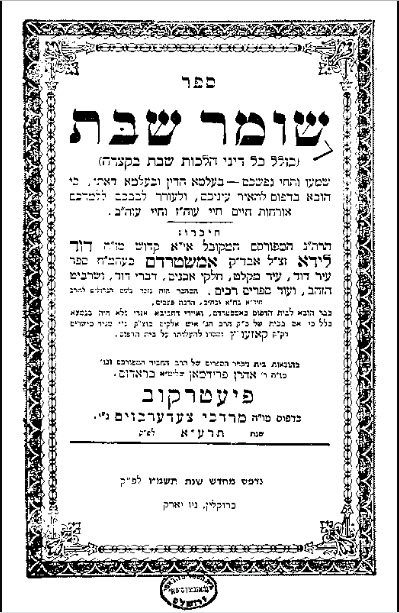“Shomer Shabbat” (שׁוֹמֵר שַׁבָּת) is a term used to describe a person who “keeps” the Sabbath. In Ashkenazic Hebrew the name of the seventh day may be pronounced “Shabbos.” You may recall a few weeks ago when we discussed the term “shamar” as meaning to guard, protect, keep. This is another usage of it.
There are 39 categories of melakhah (מְלָאכָה), work, defined in the Mishnah. The traditional rules which have been promulgated toward the observance of Shabbat include abstaining from writing, cooking, spending money, operating machinery, using electrical devices and driving (the Conservative movement has permitted these to some extent), carrying things outside the house (or outside the eruv if one has been erected), lighting fires, turning on lights, and other such activities. There also, of course, are activities which are specifically to be done (the opposite of a prohibition), including lighting the candles and other prior preparation, eating the Sabbath meal, engaging in the specific rituals and prayers both at home and at shul, resting, and engaging in marital relations (if married) under certain circumstances.
Interestingly, in the Decalogue as put forth in Exodus, we are advised to “remember” the Sabbath (“zakhor”) (Exodus 20:8), while in Deuteronomy we are advised to “keep” the Sabbath (“shamor”) (Deut. 5:12-14). And even more interestingly, we were given the Shabbat rules about the manna from Heaven before we were given the rule about remembering the Shabbat.
David ben Aryeh Leib of Lida (circa 1650-1696) wrote a book Sefer Shomer Shabbat to help folks keep the Sabbath; it is pictured below (source is Wikipedia).

Folks may be “guardians” of other aspects of Judaism, as well. For instance, someone who is shomer kashrut keeps the kosher laws, shomer mitzvot keeps the mitzvot.
In the Musaf Amidah we say, “יִשְׂמְחוּ בְמַלְכוּתְךָ שׁוֹמְרֵי שַׁבָּת וְקוֹרְאֵי עֹנֶג....” (“shomerei” being the plural). Those who keep Shabbat and call it a delight shall rejoice in Your sovereignty…” Let us keep singing “Yismehu vemalkhutekha shomerei, shomerei, shomerei Shabbat…”